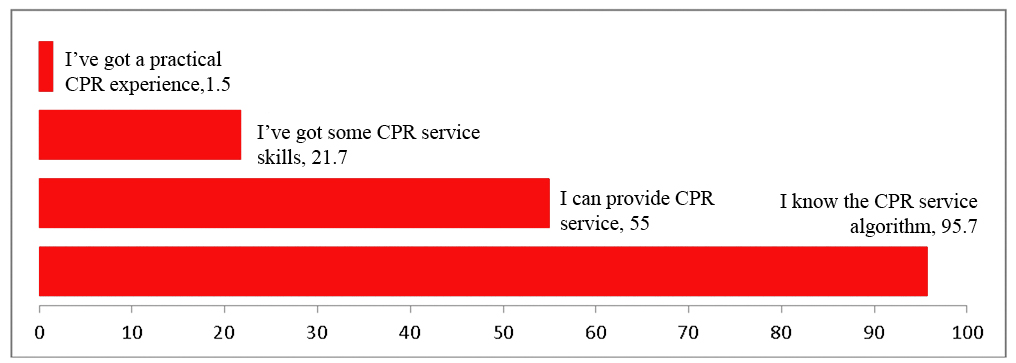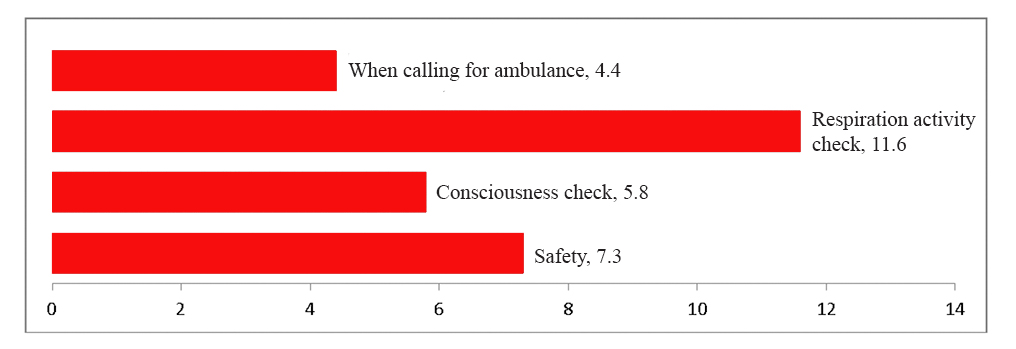First-aid knowledge and skills rating in context of GTO complex tests
Фотографии:
ˑ:
Dr.Med., Associate Professor O.A. Malkov1
Dr.Biol. A.A. Govorukhina1
Dr.Biol., Associate Professor O.L. Nifontova1
PhD, Associate Professor E.A. Bagnetova1
A.A. Novoselova1
1Surgut State Pedagogical University, Surgut
Keywords: GTO, safety, sudden cardiac death (SCD), cardiopulmonary resuscitation (CPR).
Background. Pursuant to the Presidential Decree on the Russian Physical Culture and Sports “Ready for Labour and Defence” (GTO) Complex reinstatement in the Russian Federation, the GTO Complex is applied today as a programmatic and regulatory basis for the national physical education system [6]. The staffing provisions for the GTO Complex reinstatement and preparatory initiatives for the tests imply the available human resource of the national education system being fully mobilised [3]. However, the health safety matters of the GTO Complex tests are addressed only in the relevant health service provisions [5] albeit the issues of the GTO Complex test management specialists’ knowledge and skills in the first aid domain are still uncovered in the relevant regulatory and procedural provisions.
It should be noted that sudden cardiac death (SCD) is presently ranked among the major and still unsolved problems of the mass physical culture and sports sector [2, 4]. The available sources of information have reported 8 sudden cardiac death cases at school physical education lessons for the last three years. The sudden cardiac death accounts for 5% of the total youth mortality rate (1.5 to 8.0 per 100 thousand people); and 20% of the young people’s sudden cardiac death cases occur during sporting practices [1, 2, 4, 8, 9]. It is the ventricular fibrillation that is diagnosed a direct cause in 80% of the senior children’s and adolescent’s sudden cardiac death cases [4, 8, 11].
Analyses of the practical institutional capacities of the educational establishments that train sport specialists for the mass physical culture and sports sector have demonstrated that the only feasible scenario of the initiatives to scale down the SCD cases in the mass physical culture and sporting events offers the relevant educators and coaches being trained and certified to be able to provide due first aid and cardiopulmonary resuscitation (CPR) service [2, 10, 11]. Practical experience shows that timely and modern cardiopulmonary resuscitation (CPR) procedures with application of an automatic external defibrillator may increase the survival rate in the SCD cases up to 69-74% [10, 11].
Objective of the study was to rate the cardiopulmonary resuscitation (CPR) competences and skills of the GTO Complex test management specialists.
Methods and structure of the study. The study was performed at the Biological Grounds of the Educational Environment Safety Research Laboratory of the Physical Culture and Sports Department of Surgut State Pedagogical University with funding from the Russian State Research Fund under the Social and Psychological First-Aid Training of the Educational Personnel Project #17-16-86601. Subject to the tests were the first-aid knowledge and skills of the specialists (n=69) responsible for the students’ training for and testing by the GTO Complex tests in the Surgut education system. The subjects were offered to self-rate their cardiopulmonary resuscitation (CPR) knowledge and skills. Following the questionnaire survey, that subjects’ competences in the modern CPR algorithms were tested on the whole; and skills of those subjects who claimed knowledgeable and skilful in the cardiopulmonary resuscitation service (n=54) were tested by the tests of the authors’ own design in particular.
Study results and discussion. The questionnaire survey found 90% of the respondents self-rating their first-aid knowledge and skills as sufficient: see Figure 1. However, the objective modern CPR algorithm knowledge rating tests showed a gap between the subjective and objective knowledge rates.

Figure 1. Self-rates of the modern CPR algorithm knowledge and practical CPR skills, %
Real knowledge of the modern CPR algorithm was objectively rated in the “Clinical death diagnostics”, “Chest compressions” and “Forced lung ventilation” areas: see Figures 2-4.

Figure 2. Percentage of right responses in Clinical death diagnostics

Figure 3. Percentage of right responses in Chest compressions

Figure 4. Percentage of right responses in Forced lung ventilation
The practical cardiopulmonary resuscitation (CPR) skills of the sampled subjects (n=54) were tested on a dummy using the rating tests of the authors’ design.

Figure 5. Percentages of the subjects skilful in the modern CPR algorithms
Having analysed the test data, we found the whole sample being fully unknowledgeable and unskilful in applying an automatic external defibrillator.
The study data and analyses gave grounds to conclude that as long as there is no first-aid knowledge and practical skills building system for the relevant GTO Complex tests management specialists, health safety standards of the GTO Complex test events are not high enough due to the life and health risks for the trainees and qualifiers. The situation requires the existing specialist training system being updated with a special priority given to the first aid competency and skills on the whole and the cardiopulmonary resuscitation knowledge and skills in particular. Generally the study found that the traditional annual briefings and periodical (once in five years) practical training courses fail to train knowledgeable and skilful specialists capable of providing due first aid. The existing education practices also fail to build necessary competences and skills in the specialists. It is still traditional for most national education establishments to have the first-aid courses delivered by uncertified or unduly certified first-aid instructors, and this situation is of further detriment for health safety of the GTO Complex tests. Good first-aid competences and skills on the whole including the CPR knowledge and skills in particular need to be provided by the relevant education system based on the modern education technologies.
Conclusion. The study findings have demonstrated the urgent need for modern practice-focused educational technologies (including remote ones) being designed and applied to build up the practical first-aid competences and skills in the relevant specialists and thereby meet the modern health safety standards. The system needs to be established based on well-developed and clearly formulated practical first-aid competences and skills building concept. We believe it is high time for the national education establishments that train the GTO Complex tests management specialists to establish the relevant practical first-aid training centres/ offices duly equipped with the modern teaching aids. This initiative will give the means to make a transition from the theoretical competency to the practical skills in this domain. The proposed initiatives will significantly improve the health safety standards in the GTO Complex tests.
References
- Bokeriya O.L., Ispiryan A.Y. Vnezapnaya serdechnaya smert u sportsmenov [Sudden cardiac death in athletes]. Annaly aritmologii, 2013, no. 1, pp. 31–39.
- Makarov L.M. Rasprostranennost vnezapnoy serdechnoy smerti u lits molodogo vozrasta v krupnom megapolise [Prevalence of sudden cardiac death in young people in large megalopolis]. Meditsinskiy alfavit, 2014, no. 3, pp. 35– 40.
- Metodicheskoe posobie po podgotovke grazhdan, v tom chisle po samostoyatelnoy podgotovke grazhdan i po podgotovke lits, podlezhaschikh prizyvu na voennuyu sluzhbu, k vypolneniyu normativov i trebovaniy Vserossiyskogo fizkulturno-sportivnogo kompleksa «Gotov k trudu i oborone» [Methodical manual on training of citizens, including self-training of citizens and training of draft persons, to fulfill Russian physical culture and sports "Ready for Labour and Defence" (GTO) complex tests]. Moscow, 2014, 94 p.
- Nikonova V.V., Vnezapnaya kardialnaya smert u detey i podrostkov [Sudden cardiac death in children and adolescents]. Meditsina neotlozhnykh sostoyaniy, 2013, no. 3, pp. 22 – 28.
- Organizatsiya meditsinskogo soprovozhdeniya vypolneniya normativov Vserossiyskogo fizkulturno-sportivnogo kompleksa «Gotov k trudu i oborone». Metod. posobie dlya meditsinskikh rabotnikov [Organization of medical support of fulfillment of All-Russian physical culture and sports "Ready for Labour and Defence" (GTO) complex tests. Study guide for medical workers]. Moscow, 2014. 7 pp.
- Ukaz Prezidenta RF ot 24.03.2014 N 172 «O Vserossiyskom fizkulturno-sportivnom komplekse "Gotov k trudu i oborone” (GTO)» [RF Presidential Decree No. 172 dated March 24, 2014 "On All-Russian physical culture and sports "Ready for Labour and Defence" (GTO) complex"]. Rossiyskaya gazeta, 26.03.2014, no. 68.
- Asif I.M., Rao A.L., Drezner J.A. Sudden cardiac death in young athletes: what is the role of screening? Curr. Opin. Cardiol., 2013, no.1, pp. 55 – 62.
- Asif I.M., Yim E.S., Hoffman J.M., Froelicher V. Update: Causes and symptoms of sudden cardiac death in young athletes. Phys. Sportsmed., 2015, no.1, pp. 44 – 53.
- Oliva A. et al Medico-legal perspectives on sudden cardiac death in young athletes [electronic publishing]. Int. J. Legal. Med., 2016, vol. 21.
- Sweeting J., Semsarian C. Sudden Cardiac Death in Athletes: Still Much to Learn. Cardiol Clin., 2016, no.4, pp. 531 – 541.
- Vetter V.L., Haley D.M. Secondary prevention of sudden cardiac death: does it work in children? Current Opinion in Cardiology, 2014, no. 1, pp. 68–75.
Corresponding author: physical_science@surgpu.ru
Abstract
The study was designed to rate the first-aid knowledge and skills of the specialists (n=69) responsible for the students’ training for and testing by the GTO Complex tests; with a special emphasis on the cardiopulmonary resuscitation process knowledge and skills. The questionnaire survey found 90% of the respondents self-rating their first-aid knowledge and skills as sufficient. However, the objective knowledge rating tests yielded the following rates: in the “Clinical death diagnostics”, “Chest compressions” and “Forced lung ventilation” areas, only 12%, 36% and 18% of the subjects, respectively, showed a satisfactory knowledge. The practical cardiopulmonary resuscitation (CPR) skills of the sampled subjects (n=54) were tested on a dummy; and the tests showed one of five group members being unskilful in the CPR. Furthermore, the whole sample was tested fully unknowledgeable and unskilful in applying an automatic external defibrillator. Generally the study found that the traditional annual briefings and periodical practical training courses fail to train knowledgeable and skilful specialists capable of providing first aid.




 Журнал "THEORY AND PRACTICE
Журнал "THEORY AND PRACTICE